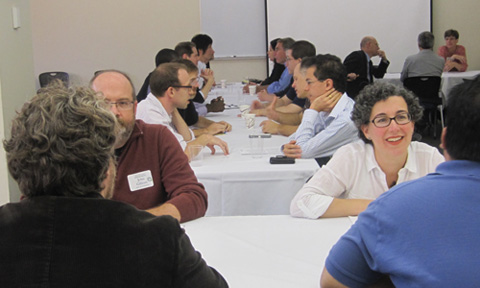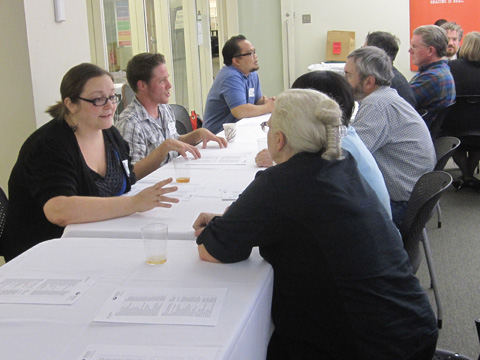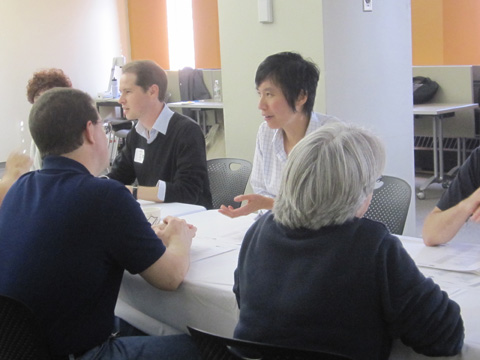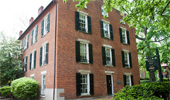 By Kelsey Miller
By Kelsey Miller
Compass
As Alden Library buzzed with students preparing for midterms this past Friday, the Friends of the Library Room on the third floor was filling with eager professors. The smell of apple cider, coffee and pumpkin bread filled the room as some of Ohio University’s veteran Arts and Sciences professors mingled with faces newer to the college.
The mingling continued until Dr. Laurie Hatch, Associate Dean of the College of Arts & Sciences and Professor of Sociology, called the meeting to order. But this wasn’t your everyday gathering of professors. Hatch organized a “speed-dating” type event as a mentoring program between senior and junior faculty within the college, with the goal to network and share advice.
Senior faculty from departments such as history, modern languages and geology were present to share wisdom and network with their less experienced counterparts. More than 30 participants attended, including about a dozen junior faculty members. Among the senior faculty were many department chairs as well as College of Arts and Sciences Dean Robert Frank. Each mentee had two minutes with a mentor to ask whatever questions they could squeeze into the time frame.
 After the speed-mentoring segment was complete, Hatch encouraged the group to share any memorable advice either given or received. Managing time was a major theme of discussion and, according to participant Kelly Faust, was the best advice she took away from the experience. An assistant professor of sociology, Faust has been with the University for going on three years and teaches three sociology courses through the year.
After the speed-mentoring segment was complete, Hatch encouraged the group to share any memorable advice either given or received. Managing time was a major theme of discussion and, according to participant Kelly Faust, was the best advice she took away from the experience. An assistant professor of sociology, Faust has been with the University for going on three years and teaches three sociology courses through the year.
“It’s important not to get swept up in others’ agendas,” Faust said. “You need to stand up for yourself in where you see your research going.” This can be rather hard for new professors to balance at first when they are expected to teach, research, publish and dedicate time to service in their departments, said Faust.
Greg Nadon, Associate Professor of Geological Sciences, gave the advice to set aside a block of time every week that is dedicated to writing and researching in your studies. His favorite advice that he gave was simple: love what you do.
“If you’re unhappy doing it, you’re not going to do a very good job,” Nadon said. “Don’t get overburdened. Don’t get overwhelmed.”
Hatch’s speed-mentoring format was a hit among the junior and senior faculty and is expected to take place each year. Hatch said she was drawn by the idea that the light atmosphere would be a way for junior faculty to feel more comfortable approaching senior faculty in the future.
 “[For the mentors] it isn’t such a big commitment and you can build a relationship and go from there,” said Hatch. “Mixers are a good way to … mix things up if you will, so it’s not just the same kind of event each time you’re meeting new people.”
“[For the mentors] it isn’t such a big commitment and you can build a relationship and go from there,” said Hatch. “Mixers are a good way to … mix things up if you will, so it’s not just the same kind of event each time you’re meeting new people.”
Hatch’s best advice was to learn how to clarify professional expectations.
“There are formal guidelines, but there are also informal expectations that are important to learn within a department and a college,” she said.
The event is just one of several Arts and Sciences initiatives to bring together faculty of varying experience levels. Hatch has also organized a “faculty learning community” that includes junior and senior faculty members. These faculty members are sharing ideas with one another about how to implement electronic portfolios in a class, with the goal of helping students to demonstrate their learning and showcase their academic accomplishments.


















Comments